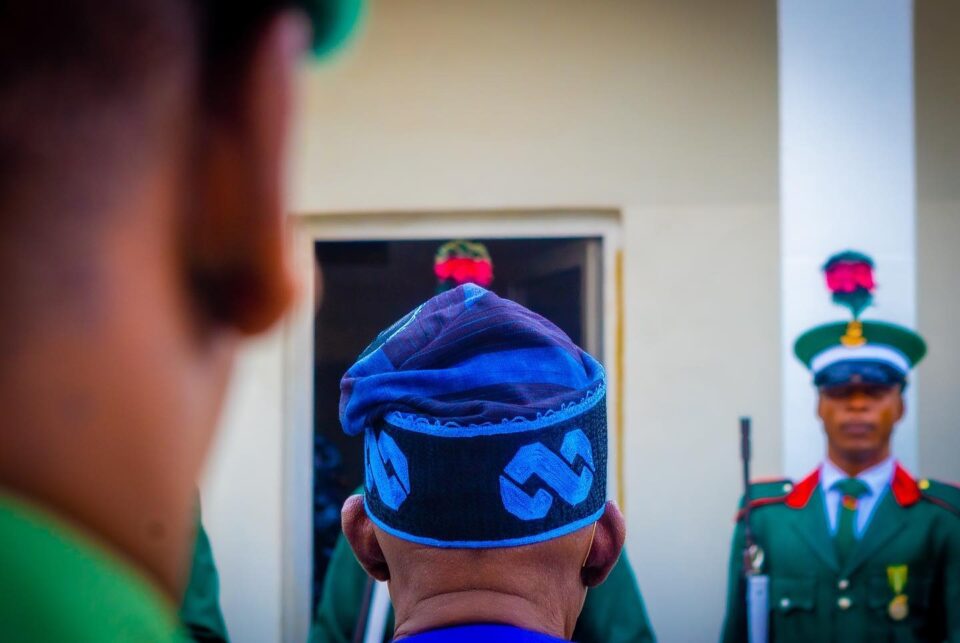In a sharp critique of President Bola Tinubu’s leadership, Phrank Shaibu, Special Assistant on Public Communication to former Vice President Atiku Abubakar, has likened the fate of Tinubu’s once-celebrated political symbol, the broken shackle, to the swastika’s historical transformation from a symbol of good fortune to one of oppression.
In a piece titled “De-cap-itated!”, released to newsmen Monday in Abuja, Shaibu drew parallels between the swastika, which was used by Adolf Hitler’s Nazi regime, and the broken shackles symbol that Tinubu and his supporters adopted during the 2023 presidential campaign.
Historically, the swastika symbolised nationalism and good fortune, representing hope across various cultures. However, its association with the Nazi regime turned it into a global emblem of fascism and hate.
Similarly, Shaibu argued that the broken shackle, initially seen as a representation of freedom and human rights, has now morphed into a symbol of oppression under Tinubu’s leadership.
“President Tinubu, in a campaign soapbox in Ogun State where he made the infamous Emilokan remarks, which is a selfish and arrogant ownership claim to power, has since made the broken shackle a symbol of oppression and political rascality,” Shaibu stated.
The Emilokan mantra, which translates to “it is my turn” in Yoruba, was once celebrated as a rallying cry for Tinubu’s supporters. It was worn proudly on caps adorned with the broken shackle symbol, known as Emilokan caps.
During the campaign, these caps symbolised Tinubu’s promise to protect human rights, boost the economy, and replicate Lagos’s success across Nigeria.
His supporters believed in his democratic credentials and ability to transform the nation into a prosperous economy. However, as Shaibu suggests, the reality has been far from the initial promise.
“Everyone now knows that Emilokan is not about shared prosperity for all but about a rabid appropriation of state assets to personal ownership,” Shaibu remarked.
He further accused Tinubu of building personal wealth by exploiting Lagosians, debunking the widely held belief that Tinubu’s governance was responsible for Lagos’ economic growth.
“Tinubu didn’t build Lagos. Rather, Tinubu built his wealth through the sweat of Lagosians,” he added.
Atiku Abubakar spokesman said the disillusionment with the Emilokan symbol has become so widespread that the caps, once proudly displayed by vendors and supporters, are now gathering dust.
“The once-eager vendors who proudly displayed the Emilokan caps at bustling traffic lights and strategic street corners now find themselves burdened by them,” Shaibu pointed out.
Once a sought-after item, the caps have become an embarrassing relic for many of Tinubu’s supporters, representing broken promises and a political regime that has shifted towards authoritarianism.
In his analysis, Shaibu also compared Tinubu to the late Chief Obafemi Awolowo, an iconic figure in Nigerian politics known for his progressive ideals.
According to Shaibu, Tinubu’s supporters initially likened him to Awolowo, believing he would follow in the legendary leader’s footsteps by delivering a prosperous and inclusive government.
However, Shaibu dismisses this comparison as a “political impersonation fraud of grand proportions.
“Everyone now knows that Tinubu is not Awolowo,” Shaibu asserted, arguing that the notion of Tinubu as a progressive leader has crumbled in the face of his administration’s actions, which appear more focused on personal gain than on the collective good.
“The disappointment with Tinubu’s administration extends beyond the political sphere.”
Shaibu claimed that the Emilokan caps, once a potent political symbol, have now become a source of embarrassment for many Nigerians.
Just as the swastika was banned from public display after the defeat of Nazi Germany, Shaibu believed that the Emilokan caps have become relics of “political deception and disappointment.”
For Shaibu, the transformation of the Emilokan symbol is emblematic of Tinubu’s broader failure to deliver on his promises. What once represented hope, freedom, and prosperity has become a reminder of missed opportunities and growing disenchantment.
Shaibu concluded his critique by noting that the political reality of Tinubu’s presidency has fallen far short of the expectations set during the campaign.
“As Nigeria grapples with the Tinubu administration’s unfolding reality, the Emilokan symbol’s fate poignantly reflects the country’s current political climate.”



